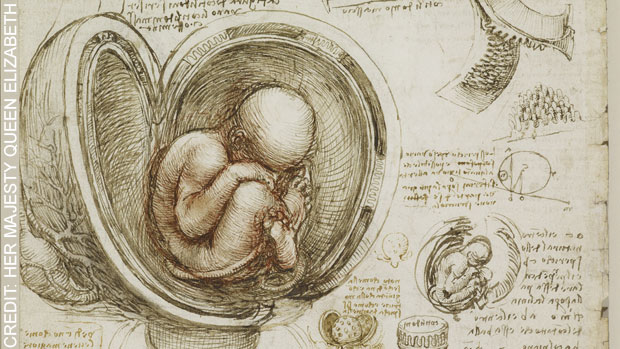Da Vinci code: DNA could solve mystery of Leonardo's grave
Remains could unlock a wealth of information about painter's life – and show us how he really looked

A free daily email with the biggest news stories of the day – and the best features from TheWeek.com
You are now subscribed
Your newsletter sign-up was successful
Scientists are combing Leonardo da Vinci's notebooks and sketches for DNA that might solve the mystery of where the Renaissance polymath is buried.
Da Vinci died on 2 May 1519, while in the service of Francis I of France, and was originally laid to rest in the chapel of Saint-Florentin at the royal Chateau d'Amboise in the Loire Valley.
However, the chapel was destroyed during the French Revolution and the artist's body considered lost.
The Week
Escape your echo chamber. Get the facts behind the news, plus analysis from multiple perspectives.

Sign up for The Week's Free Newsletters
From our morning news briefing to a weekly Good News Newsletter, get the best of The Week delivered directly to your inbox.
From our morning news briefing to a weekly Good News Newsletter, get the best of The Week delivered directly to your inbox.
A team of amateur archaeologists on the site later discovered remains they believed were those of da Vinci and had them re-interred in another chapel on the grounds, the Saint-Hubert, in 1874. A plaque refers to it as the "presumed" location of the artist and inventor's resting place.
Now experts in genetic testing from the J Craig Venter Institute in California are preparing to examine one of Da Vinci's most famous paintings, the Adoration of the Magi, for any traces of skin, hair or fingerprints which could belong to the Renaissance Master.
"It is well known that Leonardo used his fingers along with his brushes while painting, some prints of which have remained, and so it could be possible to find cells of his epidermis mixed with the colours," Jesse Ausubel, the vice chairman of the Richard Lounsbery Foundation, which is funding the project, told the Daily Telegraph.
Any genetic material the scientists uncover will be compared with Da Vinci's living relatives to establish whether it belonged to the Florentine artist.
A free daily email with the biggest news stories of the day – and the best features from TheWeek.com
DNA samples will then be taken from the presumed grave site to see whether the remains are those of Da Vinci, in a similar way to which scientists uncovered the grave of Richard III in a Leicester car park last year.
If the genetic testing proves that the Saint-Hubert chapel is Da Vinci's final resting place, the specialists will seek permission to exhume the remains. This would provide the opportunity to reconstruct the artist's face from his skull, test his bones to find out his diet and perhaps even discover the unknown illness which led to his death aged 67.
"We stand to gain not only greater historical knowledge of Leonardo, but possibly a reconstruction of his genetic profile, which could provide insights into other individuals with remarkable qualities," Ausubel said.
-
 How the FCC’s ‘equal time’ rule works
How the FCC’s ‘equal time’ rule worksIn the Spotlight The law is at the heart of the Colbert-CBS conflict
-
 What is the endgame in the DHS shutdown?
What is the endgame in the DHS shutdown?Today’s Big Question Democrats want to rein in ICE’s immigration crackdown
-
 ‘Poor time management isn’t just an inconvenience’
‘Poor time management isn’t just an inconvenience’Instant Opinion Opinion, comment and editorials of the day
-
 Epstein files topple law CEO, roil UK government
Epstein files topple law CEO, roil UK governmentSpeed Read Peter Mandelson, Britain’s former ambassador to the US, is caught up in the scandal
-
 Iran and US prepare to meet after skirmishes
Iran and US prepare to meet after skirmishesSpeed Read The incident comes amid heightened tensions in the Middle East
-
 Israel retrieves final hostage’s body from Gaza
Israel retrieves final hostage’s body from GazaSpeed Read The 24-year-old police officer was killed during the initial Hamas attack
-
 China’s Xi targets top general in growing purge
China’s Xi targets top general in growing purgeSpeed Read Zhang Youxia is being investigated over ‘grave violations’ of the law
-
 Panama and Canada are negotiating over a crucial copper mine
Panama and Canada are negotiating over a crucial copper mineIn the Spotlight Panama is set to make a final decision on the mine this summer
-
 Why Greenland’s natural resources are nearly impossible to mine
Why Greenland’s natural resources are nearly impossible to mineThe Explainer The country’s natural landscape makes the task extremely difficult
-
 Iran cuts internet as protests escalate
Iran cuts internet as protests escalateSpeed Reada Government buildings across the country have been set on fire
-
 US nabs ‘shadow’ tanker claimed by Russia
US nabs ‘shadow’ tanker claimed by RussiaSpeed Read The ship was one of two vessels seized by the US military